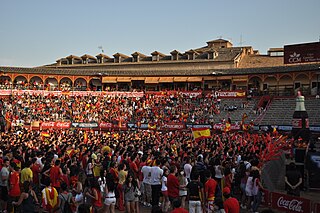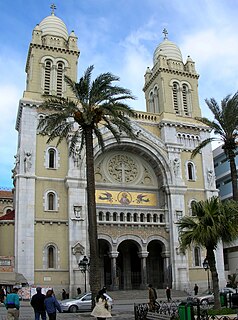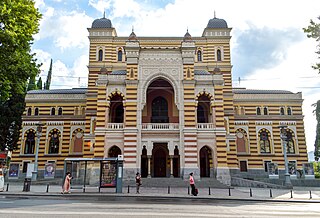 W
WMoorish Revival or Neo-Moorish is one of the exotic revival architectural styles that were adopted by architects of Europe and the Americas in the wake of the Romanticist fascination with all things oriental. It reached the height of its popularity after the mid-19th century, part of a widening vocabulary of articulated decorative ornament drawn from historical sources beyond familiar classical and Gothic modes. Neo-Moorish architecture drew on elements from classic Moorish architecture and, as a result, from the wider Islamic architecture.
 W
WIn 1878 the Austro-Hungarian Empire occupied Bosnia and Herzegovina and in 40 years had an immense influence in future urban planning and architecture. Stylistically, Bosnia was to be assimilated into the European mainstream, save for the appearance of the Orientalist style.
 W
WMoorish architecture, is a style within Islamic architecture which developed in the western Islamic world, which included al-Andalus, and the Maghreb. The term "Moorish" comes from the Western European designation of the Muslim inhabitants of these regions as "Moors", which itself comes from Latin "Mauri", originally a designation of the inhabitants of the Berber kingdom of Mauretania. Some scholars also use the term Western Islamic architecture or "architecture of the Islamic west" for this subject.
 W
WThe architecture of Casablanca is diverse and historically significant. Casablanca, Morocco's economic capital, has a rich urban history and is home to many notable buildings in a variety of styles. Throughout the 20th century, architecture and urban development in Casablanca evolved in a way that was simultaneously specific to the city's contexts, and consonant with international ideas.
 W
WBristol Byzantine is a variety of Byzantine Revival architecture that was popular in the city of Bristol from about 1850 to 1880.
 W
WThe bullring is a building located in Toledo, Castile-La Mancha, Spain.
 W
WLa Casamaures is a historic 19th century villa, in the commune of Saint-Martin-le-Vinoux near Grenoble, in the Department of Isère, within the Auvergne-Rhône-Alpes region of France. A listed French Monument historique, it is undergoing restoration.
 W
WThe Cathedral of St. Vincent de Paul is a Roman Catholic church located in Tunis, Tunisia. The cathedral is dedicated to Saint Vincent de Paul, patron saint of charity. It is the episcopal see of the Archdiocese of Tunis and is situated at Place de l'Indépendence in Ville Nouvelle, a crossroads between Avenue Habib Bourguiba and Avenue de France, opposite the French embassy.
 W
WThe Central Post Office of Casablanca is a post office on Boulevard de Paris and Hassan II Boulevard in Casablanca, Morocco. It was designed by Adrien Laforgue in an architectural style described as "neo-mauresque" and was constructed from 1918 to 1920 under the French Protectorate.
 W
WThe Villa Crespi is a 19th-century Moorish revival-style rural palace, now a luxury hotel and restaurant, located on Via G. Fava 18, near the shores of Lago D'Orta in the town of Orta San Giulio, Province of Novara, Piedmont, Italy. It is notable for its scenic tall minaret-like tower. The interior atrium has a dazzling degree of stucco arabesque decoration.
 W
WThe Heliopolis Palace is one of the three Egyptian presidential palaces and residences, the others being Montaza Palace and Ras el-Tin Palace, for the executive office of the President of Egypt. It is located in the suburb of Heliopolis, northeast of central Cairo and east of the Nile in Egypt. It was originally built as the grand Heliopolis Palace Hotel in 1910. Now it is for the use of the President of Egypt.
 W
WCentral Bathhouse Vienna is a bathing establishment in Vienna, Austria.
 W
WThe Mevlana Mosque is a mosque in northwestern Rotterdam, Netherlands which serves mainly Turkish-Dutch Muslims. The mosque, named after Rumi, was built in 2001 and benefits from two minarets. The mosque was voted as Rotterdam's most attractive building in 2006.
 W
WThe Moorish Mosque, Kapurthala situated in Kapurthala in the Indian State of Punjab is patterned on the lines of the Grand Mosque of Marrakesh, Morocco. It was commissioned by Maharajah Jagatjit Singh, the last ruler of Kapurthala. Kapurthala city, was then the capital city of the Kapurthala State, known as 'Mini Paris of Punjab' and the mosque was stated to be one of the best in South-east Asia. The mosque is a national monument protected by the Archaeological Survey of India.
 W
WThe Morisco Kiosk is a kiosk structure in Colonia Santa María la Ribera in Mexico City, Mexico. It is situated in the Alameda Park in the center of the Colonia neighborhood, at the intersection of Dr. Atl and Salvador Miron Streets, near Metro Buenavista. The kiosk is built in the neo-Mudejar architectural style that was prevailing in Spain in the 19th century. It is completely made of wrought iron with a glass cupola dome at the top. The kiosk is made of panels that can be disassembled and moved if needed.
 W
WThe Church of Our Lady of the Rosary and Saint Dominic, popularly known as Iglesia de los Domínicos, is a Roman Catholic parish church in the neighbourhood of Cordón, Montevideo, Uruguay.
 W
WThe Georgian National Opera and Ballet Theater of Tbilisi, formerly known as the Tiflis Imperial Theater, is an opera house situated on Rustaveli Avenue in Tbilisi, Georgia. Founded in 1851, Tbilisi Opera is the main opera house of Georgia and one of the oldest such establishments in Eastern Europe and Western Asia.
 W
WThe Madrasa Thaalibia, is a madrasa located in Algiers, Algeria. It was founded on 17 October 1904 by Charles Jonnart and subsequently became one of the leading spiritual and educational centres of Algeria.